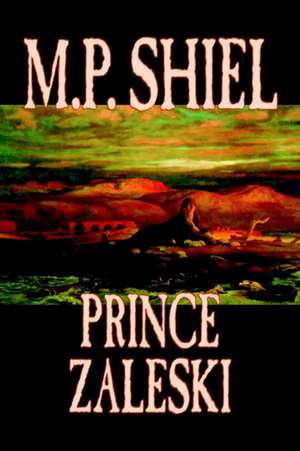Prince Zaleski
Autor M. P. Shielen Limba Engleză Paperback – 31 iul 2005
| Toate formatele și edițiile | Preț | Express |
|---|---|---|
| Paperback (5) | 44.95 lei 22-36 zile | |
| CREATESPACE – | 44.95 lei 22-36 zile | |
| Echo Library – 31 aug 2006 | 74.94 lei 38-44 zile | |
| Aegypan Press – 31 iul 2005 | 81.50 lei 43-57 zile | |
| Book Jungle – 23 noi 2008 | 83.57 lei 43-57 zile | |
| Valancourt Books – 31 oct 2009 | 124.11 lei 43-57 zile |
Preț: 81.50 lei
Nou
Puncte Express: 122
Preț estimativ în valută:
15.59€ • 16.33$ • 12.90£
15.59€ • 16.33$ • 12.90£
Carte tipărită la comandă
Livrare economică 07-21 aprilie
Preluare comenzi: 021 569.72.76
Specificații
ISBN-13: 9781598184365
ISBN-10: 1598184369
Pagini: 116
Dimensiuni: 152 x 229 x 7 mm
Greutate: 0.18 kg
Editura: Aegypan Press
Colecția Aegypan
Locul publicării:United States
ISBN-10: 1598184369
Pagini: 116
Dimensiuni: 152 x 229 x 7 mm
Greutate: 0.18 kg
Editura: Aegypan Press
Colecția Aegypan
Locul publicării:United States
Notă biografică
Matthew Phipps Shiell (1865 - 1947) - known as M. P. Shiel - was a prolific British writer of West Indian descent. His legal surname remained "Shiell" though he adopted the shorter version as a de facto pen name. He is remembered mostly for supernatural horror and scientific romances. His work was published as serials, novels and as short stories. The Purple Cloud (1901, revised 1929) remains his most famous and often reprinted novel. Around 1899-1900 Shiel conceived a loosely linked trilogy of novels which were described by David G. Hartwell in his introduction to the Gregg Press edition of The Purple Cloud as possibly the first future history series in science fiction. Each was linked by similar introductory frame purporting to show that the novels were visions of progressively more distant futures glimpsed by a clairvoyant in a trance. Notebook I of the series had been plotted at least by 1898, but would not see print until published as The Last Miracle (1906). Notebook II became The Lord of the Sea (1901), which was recognized by contemporary readers as a critique of private ownership of land based on the theories of Henry George.
